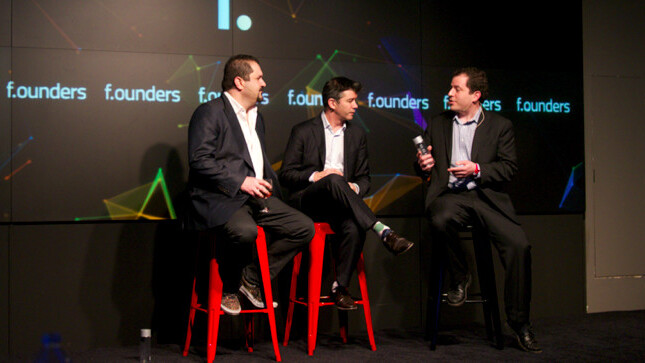
Today at the F.ounders 2013 event at NASDAQ MarketSite in NYC, Travis Kalanick of Uber and Shervin Pishevar of Menlo Ventures talked about the tension between disruption and regulation.
Uber currently operates in 30 cities and recently soft launched in Lyon, France. Kalanick says that it’s now serving hundreds of thousands of rides and is growing 20% month over month. He notes that the company is profitable in every city that they’ve operated in over 1 year.
Moderator Peter Kafka, of All Things D, asked Kalanick right out of the gate about whether he expected to have to fight regulatory issues at every turn and whether he knew that Uber was ‘illegal’ in many locations (Kalanick disputed the term illegal immediately).
“I would characterize it very differently…I didn’t cause the problem,” says Kalanick. “I don’t wish that upon anybody, including myself. When we started in San Francisco, it was a lifestyle play. We wanted to push a button and get a ride…we just wanted to be baller in SF.”
Kalanick says that there are various legal issues that they’re fighting including regulators that he says are trying to preserve the ‘status quo’ and what he says is outright ‘corruption’.
“We don’t beg for forgiveness,” in those cities, says Kalanick, “because we’re legal.”
“I think it takes courage,” says Pishevar on why Menlo invested in a business that was bound to have controversy, “and I was inspired by one meeting with Travis that he has what it takes to fight as hard as it takes not to give in, in the face of corruption…and that’s been borne out.”
Both Pishevar, an investor in Uber via Menlo Ventures, and Kalanick used the term corruption repeatedly.
“When city council people are arrested and put in jail because they’ve been paid off by taxi companies,” said Kalanick, “…I don’t care who the f*ck they’re protecting, that’s corruption.”
Then the talk turned to the pricing and perception of Uber.
“Characterizing [Uber] as a ‘rich man’s service’ is a misunderstanding of the facts,” Kalanick replied, noting the cheaper UberX and Uber Taxi (repurposed city taxi) services.
Kalanick was also quizzed about the ‘surge pricing’ controversy which had Uber charging a significant amount more over New Years in some cities. He says that they implemented ‘surge sobriety’ in the app which required that users enter in what their current surge rate was, in order to have them verify that they were going to get charged much more. This, he says, reduced complaints a hundred fold.
Kafka then pivoted quickly to toss out a question about whether Pishevar would have been able to build a social gaming company on Facebook today, with the shifting focus of Facebook’s platform.
“No, you couldn’t build the same kind of company on Facebook in today’s environment,” Pishevar said. He also noted that he would likely focus on mobile completely and ignore the web entirely.
Kalanick appeared to come out swinging in the face of accusations that Uber was ‘moving first and asking permission later’, essentially inciting the regulatory opposition that they’ve come up against by moving into what may be combative territories. He noted that one in five cities had an issue but repeatedly noted that what Uber was doing wasn’t illegal, but instead was facing friction from people who had a vested interest in keeping the traditional taxi model intact.
Get the TNW newsletter
Get the most important tech news in your inbox each week.




